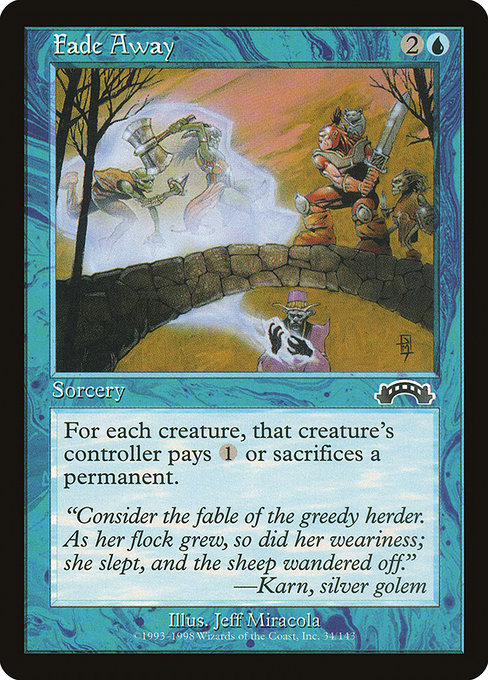
Image courtesy of Scryfall.com
Foreshadowing in Exodus Lore: Fade Away and the Quiet Power of Sacrifice
Blue magic often isn't about raw destruction; it's about control, tempo, and the subtle art of making every decision count. Fade Away, a common blue sorcery from the Exodus era, embodies that mindset with a single, stark premise: for each creature, its controller sacrifices a permanent of their choice unless they pay {1}. At 3 mana total (two colorless and one blue), this spell sits squarely in the midrange of the set’s puzzle pieces—powerful enough to tilt the board, intimate enough to be a quiet whisper in a crowded story. 🧙♂️🔥
“Consider the fable of the greedy herder. As her flock grew, so did her weariness; she slept, and the sheep wandered off.” — Karn, silver golem
The flavor text anchors Fade Away in Exodus’s broader tapestry: stories of tradeoffs, loyalty, and consequences that echo beyond the battlefield. Karn’s cautionary line underlines a timeless MTG theme—growth invites risk, and every advantage carries a cost you can’t escape. This foreshadowing isn’t just lore for lore’s sake; it mirrors how the set’s plot threads unfold: alliances fray, plans unravel, and the simplest blue spell can precipitate a cascade of decisions that redefine the tempo of a game. 🥽💎
Foreshadowing Across the Set’s Storylines
Exodus (1998) is remembered for its sprawling Weatherlight narrative, the tug-of-war between old loyalties and new ambitions, and the meta-game of who can survive the consequences of their own plans. Fade Away slots neatly into that framework by foregrounding a recurring question: who pays, and when, to preserve what you’ve built? In multiplayer and two-player formats alike, the card’s text acts as a microcosm of the set’s larger foreshadowing—every claimed battlefield, every doubled alliance, and every fragile token you anchor to the board can be undone by someone deciding to press the "tax" button. The set’s lore often hints that power without accountability yields collapse; Fade Away makes that dynamic feel personal on every play, as players tally what they’re willing to sacrifice to maintain momentum. 🎲⚔️
From a storytelling perspective, the spell’s permission-based cost mirrors many Exodus arcs where characters must weigh immediate gains against long-term costs. In the Weatherlight saga, decisions are rarely isolated; they ripple through crews, ships, and plans. Fade Away translates that atmosphere into a card you’ll draft and play with a sense of narrative purpose—knowing that a choice to pay {1} can feel like a strategic vote in a larger cosmic boardroom. 🧭🎨
Design, Theme, and Gameplay Echoes
Fade Away is a classic example of Blue’s tax-and-control toolkit. The card’s wording—“For each creature, its controller sacrifices a permanent of their choice unless they pay {1}”—creates a global, equity-based pressure. It rewards players who can curate a stable of expendable permanents or mana-synergy combos, while punishing those who recklessly over-commit to the board. The result is a tense, melodious dance: you pare down threats, your opponent fights to keep their best pieces online, and the table tilts as choices accumulate. In practice, it’s a tempo spell with political undertones, one that rewards precise timing and a willingness to take calculated risks. 🧙♀️💎
In terms of deck-building philosophy, Fade Away invites an archetype that blue players adore: the disciplined, resourceful control shell. It shines alongside spells that draw, disrupt, or reset, turning a fragile moment into a lasting advantage. When you resolve Fade Away, you’re not just erasing threats—you’re inviting a recalibration of who’s ahead and at what cost. That dynamic resonates with Exodus’s broader storytelling: momentum is fragile, and the true narrative arc comes from how players adapt to the shifting landscape. 🧭🔥
Art, Rarity, and Collectibility
Jeff Miracola’s illustration for Fade Away captures a mood of quiet, blue-hued calculation. The frame style dates to the 1997 era, and the art’s composition leans into the card’s subtext: a spell that compels others to rethink what they’re willing to give up. As a common rarity in Exodus, Fade Away presents an approachable entry point for vintage enthusiasts and newer collectors alike—a reminder that not every iconic moment in MTG comes with a premium price tag. Its EDHREC rank of 12,384 suggests it isn’t a must-have in every deck, but it remains a beloved piece for players who relish the old-school Exodus look and feel. The card’s current USD price hovers around modest territory, reinforcing its status as a shrewd pickup for players chasing flavor, nostalgia, and reliable control options. ⚔️🎨
The historical footprint extends beyond playability: Exodus is a milestone in the game’s history, bridging the classic foundational feel with the mid-90s to late-90s shift toward more intricate, story-driven sets. Fade Away serves as a tiny lens into that era—an artifact that invites both tactical contemplation and a sense of wonder about the saga it sits within. 🧙♂️💎
Cross-Promotion and a Little Desk Magic
In the spirit of celebrating MTG’s endless crossovers between game, lore, and culture, this card makes a perfect nod to the tactile, real-world rituals of collecting and desk-destinations. If you’re a fan who enjoys pairing your favorite plays with tangible memorabilia, consider a small desk upgrade that nods to the set’s vibe—like a stylish mouse pad that keeps your battlefield clear while you scout for your next major move. The featured product below blends retro MTG vibes with everyday utility, a tiny tribute to the game’s enduring aesthetics. 🔥🎲
Custom Mouse Pad 9.3x7.8 in White Cloth Non-SlipMore from our network
- https://transparent-paper.shop/blog/post/debunking-top-seo-myths-for-2025-what-really-works/
- https://crypto-acolytes.xyz/blog/post/intro-to-daos-a-clear-guide-to-decentralized-organizations/
- https://blog.rusty-articles.xyz/blog/post/how-to-spot-genuine-craftsmanship-in-round-or-rectangular-neoprene-mouse-pads/
- https://blog.zero-static.xyz/blog/post/how-buyouts-impact-small-set-mtg-cards-galvanic-alchemist/
- https://crypto-acolytes.xyz/blog/post/helium-network-token-reacts-to-recent-news-with-downward-momentum-on-solana/